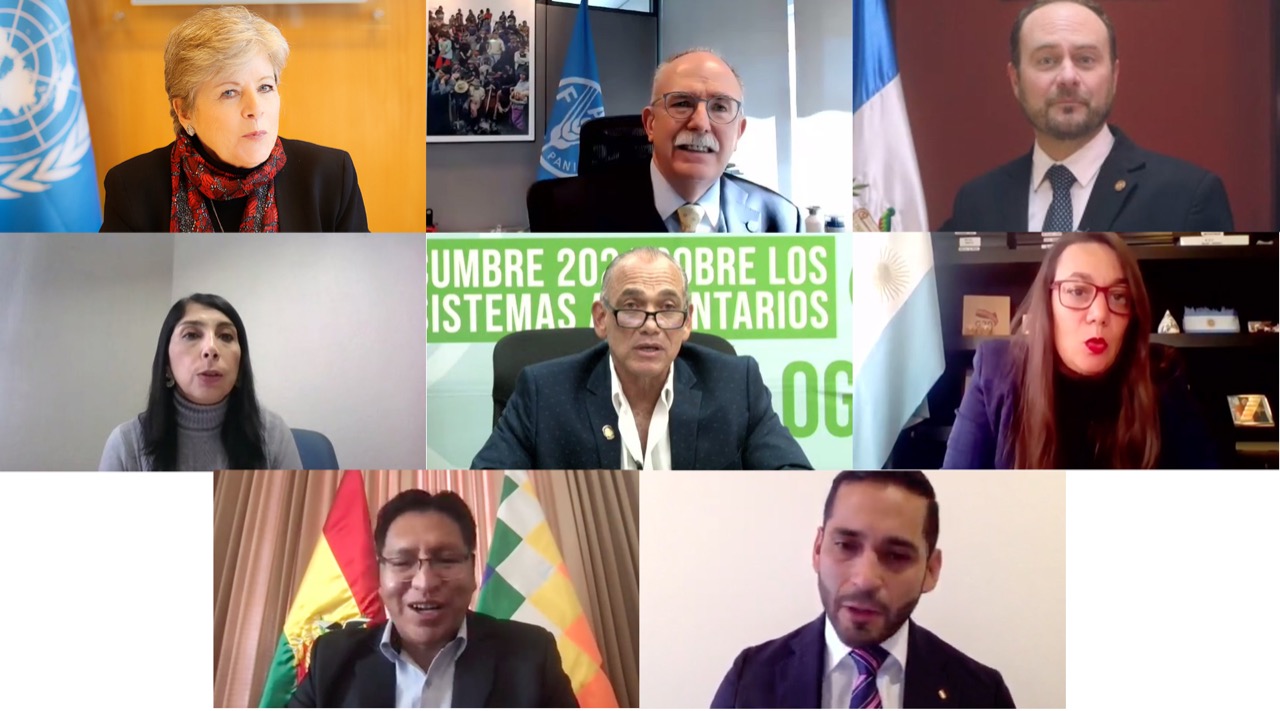Authorities and Specialists Addressed Challenges and Opportunities for Building More Inclusive, Sustainable and Resilient Food Systems in the Region
Work area(s)
ECLAC and FAO, in collaboration with other United Nations entities present in Latin America and the Caribbean, organized a regional dialogue prior to the Food Systems Summit 2021.

Ministers and high-level authorities from Latin American and Caribbean countries, along with United Nations officials and representatives of specialized organizations, exchanged views about the challenges and opportunities for building more inclusive, sustainable and resilient food systems, during a virtual regional dialogue organized by the Economic Commission for Latin America and the Caribbean (ECLAC) and the Food and Agriculture Organization of the United Nations (FAO), with the collaboration of the United Nations funds, agencies and programs present in the region.
The event, entitled Identifying Common Ground in Latin America and the Caribbean ahead of the Food Systems Summit, featured opening remarks by Alicia Bárcena, ECLAC’s Executive Secretary; Julio Berdegué, FAO’s Regional Representative for Latin America and the Caribbean; and Pedro Brolo Vila, Minister of Foreign Affairs of the Republic of Guatemala (by video).
“The current crisis is creating a sense of urgency that we should harness to create more robust, inclusive, sustainable and competitive food systems,” Alicia Bárcena stated, adding that “the pandemic has demonstrated the centrality of food systems for maintaining the flow of food – globally, regionally and nationally – from our fields to populations that are confined due to lockdowns and restrictions on movement. It has also exposed our vulnerabilities.”
FAO’s Regional Representative, Julio Berdegué, stressed that “there can be no sustainable development if we are not able to rebalance, reorient and transform food systems.” In Latin America and the Caribbean, 60 million people are experiencing hunger (14 million more than in 2019), and 6 million children suffer from chronic undernutrition, he said. “We have moved backwards by 14 years in the fight against hunger. We are facing a true food crisis in our region,” he warned.
Meanwhile, Guatemalan Foreign Minister Pedro Brolo Vila emphasized that “this is a major opportunity, on a regional level, for us to move forward on political commitments to address the challenges of malnutrition, hunger and food insecurity, developing initiatives and seeking to ensure financial and social sustainability.”
Other speakers at the event included Karla Rubilar, Minister of Social Development and Family of Chile; Renato Alvarado, Minister of Agriculture and Livestock of Costa Rica; Erwin Freddy Mamani Machaca, Deputy Minister of Foreign Affairs of the Plurinational State of Bolivia; Hernán Mendoza, Vice Minister of Rural Development of Ecuador; Jesús Quintana, Managing Director for the Americas of the Alliance of Bioversity International and the International Center for Tropical Agriculture (CIAT); Juan Rivera, Director of the National Institute of Public Health of Mexico; Jessica Jacob, Regional Coordinator for Latin America and the Caribbean of the Green Climate Fund; Myrna Cunningham, President of the Directive Council of the Fund for the Development of the Indigenous Peoples of Latin America and the Caribbean (FILAC); Leticia Teleguario, a representative of UN Women; and Efraín Quicaña, a regional specialist on rural economics at the International Labour Organization (ILO).
In her closing remarks, Alicia Bárcena summed up the main issues addressed by these government representatives and specialists.
During the dialogue, she said, they discussed the importance of diversifying food and agro-food systems; protecting biodiversity and bolstering agrobiodiversity; ensuring sustainable water management with governance schemes; prioritizing land conservation; incorporating the knowledge and diversity of cultures and wisdom of indigenous peoples; and harnessing opportunities for investment in the bioeconomy area, including nature-based solutions.
“We also debated the need to foster innovation and opportunities for young entrepreneurs, and to expand family agriculture’s access to new technologies; and to reduce gender gaps, incorporating women throughout the value chain and moving towards a care society that would care for the environment, food, health and people,” she added.
Finally, Bárcena stated, the participants underlined the urgency of increasing investment and financing; of promoting a link between the system for school meals and local production; and of addressing challenges on health and nutrition matters, due to the double burden of malnutrition (the simultaneous occurrence of undernutrition and problems related to overweight-obesity) in countries.
We need to promote healthier lifestyles, enhance the role of Latin America and the Caribbean as a food-providing region without affecting our biodiversity and ecosystems, and create synergies and complementarities between ancestral, scientific and technological knowledge, Bárcena sustained in her remarks.
In the framework of the event, a document was disseminated entitled Declaration by United Nations System agencies, funds and programs in Latin America in support of the United Nations Food Systems Summit, which was signed by ECLAC, FAO, the International Fund for Agricultural Development (IFAD), the ILO, UN Women, the United Nations Educational, Scientific and Cultural Organization (UNESCO), the World Food Programme (WFP), the United Nations Development Programme (UNDP), and the United Nations Environment Programme (UNEP).
Prior to the regional dialogue, 37 independent dialogues were held in the distinct countries of Latin America and the Caribbean along with 58 national dialogues, which will nourish the region’s contribution to the United Nations Food Systems Summit 2021, convened by UN Secretary-General António Guterres.
Type
Country(ies)
- Latin America and the Caribbean
Contact
Public Information Unit
- prensa@cepal.org
- (56 2) 2210 2040